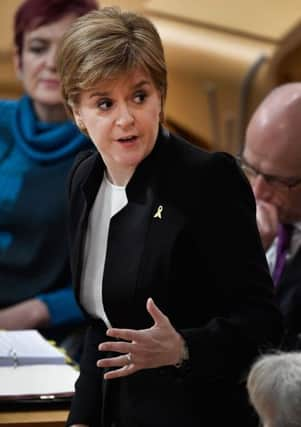They're just like us,despite appearances


Where politicians lie on this shedding scale will no doubt depend on your view of your elected representative. But without doubt to become an MP, MSP or even councillor, your skin needs to be particularly thick to deal with the slings and arrows of verbal and written attack.
Why do we treat politicians in this fashion? Is it because they’ve had the temerity to believe they can change people’s lives? Does that mean they’re getting above themselves? Do we (a sweepingly generalised we) want to bring them down to size? Is this why – such as in the recent exposé of Keith Vaz – there’s a widespread feeling of “serves him right”?
Advertisement
Hide AdAdvertisement
Hide AdWhy should we need it affirmed that our politicians are as flawed, as human, as the rest of us? That they’re nothing special after all.
Our relationship with politicians is complex. They’re a necessary evil as part of our democracy. They’re in it for themselves. They get elected then forget where they came from (this mostly applies to the more left-leaning). And yet, in the aftermath of the appalling murder of Jo Cox, social media was awash with people thanking their MPs for the job they do, proving just how vital is their role in our society.
If you wonder why anyone would go into politics in the first place it’s more puzzling as to why they would offer up anything about themselves which could make them appear more vulnerable? Why would they shed any of that tough skin if all it’s met with is criticism?
David Cameron certainly got his taste of that any time he spoke of his disabled son Ivan, who so sadly passed away when he was just six. He obviously couldn’t really care about his child if he was cutting disabled people’s benefits or privatising the NHS, went the twisted logic.
Advertisement
Hide AdAdvertisement
Hide AdNicola Sturgeon has also been met with this strange thought process after she told of her and her husband Peter’s heartache when she suffered a miscarriage five years ago.
Too many dunderheads immediately believed that such a personal revelation was in some way political; an attempt at a sympathy vote.
If it was political then let a national resolution state that this country no longer regards miscarriage as a subject that is taboo; that this country notes that one in six of all pregnancies ends in miscarriage, yet it’s an issue which women – and couples – are still not expected to talk about; and that we demand more research is done into why some women seem to suffer far more miscarriages than others.
Of course it was a personal story, no doubt finally told because she has been asked so often about “having children”. I once asked her about whether kids were likely in an interview when she was about to become First Minister. She told me it “just hadn’t happened”.
Advertisement
Hide AdAdvertisement
Hide AdWas it prurient to ask or was it in the public interest? I’d say the latter. She is our first female First Minister. The first Scottish woman to rise to the top of the political tree. A role model. So many women juggle career and family, knowing how she got there, the choices she made, are of real interest. Turns out there was no choice at all, just a sadness. But by revealing such a personal story Nicola Sturgeon has shed a bit more of that tough skin. Not physical so much this time, as emotional.
We should be pleased she did. We’re all vulnerable after all. It’s part of the human condition. It’s what really makes politicians just like us.